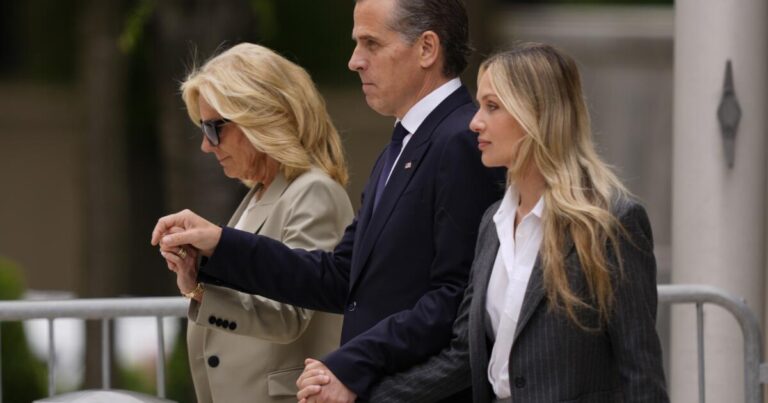Americans of a certain ideology would have you believe that Donald Trump’s prosecution and conviction for concealing hush money payments to Stormy Daniels and falsifying business records to protect his 2016 presidential candidacy was engineered by the Biden administration, which “rigged” the entire justice system in favor of the current president, except of course for Hunter Biden’s conviction, which was a justifiable retribution handed down by an honest and independent court.
On the other hand, partisans on the political spectrum might argue that while President Biden’s son was technically breaking the law when he lied on paperwork to buy a gun while high on cocaine, he is the victim of prosecutors and courts that have bent over backwards to pretend to be free from partisan politics.
It’s a real-life version of the old adage: after every court decision, one party renews its faith in the justice system while the other party becomes convinced that all judges and juries are incompetent, bribed, or out to frame them.
Another way of looking at it might be that, on the whole, the courts operate independently from the political world.
But again, this is not accurate. While competent judicial systems do their best to impose criminal penalties and impunity without being influenced by political leanings, popularity, or personal interest, politics deeply shapes the criminal justice system.
Most state judges and local prosecutors must campaign for office. Federal judges are nominated by political cronies, appointed by the president and, like federal prosecutors, confirmed or rejected by the partisan Senate.
It is nonsensical to claim that justices are free from political views or connections, or that political interests or public opinion have no influence on the outcome of cases. Clarence Thomas was not the first Supreme Court justice to accept free gifts from acquaintances who had financial or ideological interests at stake. Samuel A. Alito Jr. is not the first justice to publicly display his political leanings or biases.
Even the ancient myths that form the literary and philosophical basis of our justice system acknowledge a degree of political interference from the beginning.
The playwright Aeschylus and other ancient Greek authors told of what was, according to their legend, the first trial in history, of Orestes for the murder of his own mother. Should the son be punished forever for this horrible act? Or, because his mother had killed his father, would Orestes be obliged (and at the command of Apollo) to kill his mother in revenge, under the ancient system of blood vendettas and endless retribution? Athena appointed the first jury (12 people, of course), but they were divided.
If Athena votes for Orestes, he wins, which was probably her plan all along, and perhaps the first mythical trial was rigged.
So, do we despair of the possibility of a fair trial and view the courts as simply another arena for domination by the most powerful, the wealthiest, the best connected, the most popular?
No. Politics inevitably play a role in the justice system, but the American system is countered and held in check not by Greek gods and goddesses, but by a set of basic procedures and rituals. There are detailed rules for summonsing jurors, jury selection procedures, instructions, deliberation, etc., as well as rules for evidence, witness testimony, public and press scrutiny, appeals, and pardons.
Witnesses place their hands on the Bible and swear to tell the truth, and yet courts are human institutions run by flawed humans, and they can only be as honest and fair as they can with each other and the law.
What makes Trump’s “two-tiered” justice system so laughable is the absurd implication that he, a spoiled, wealthy, and privileged man, is at the bottom of both tiers, when in fact our system still separates criminal defendants based on wealth, with those who can make bail (like Trump) going free and those who can’t staying in prison.
Despite laws banning racial discrimination, prosecutors still screen juries by race, religion, and other attributes to gain a strategic advantage. The Supreme Court still operates without any serious checks on the ethical lapses of individual judges. The justice system still is more likely to ensnare black defendants than white defendants for the same crimes, and is still more likely to convict and punish black defendants more severely.
Our task, knowing that the job is never truly done, is to continue to purge politics from our justice system and to defend against attempts by Trump and others to further inject politics into it by calling convicted and incarcerated criminals “hostages,” dangling pardons to his supporters, claiming immunity for the president’s actions (his own, not Biden’s), and claiming that his sentence was the product of a rigged system that only he can fix.

